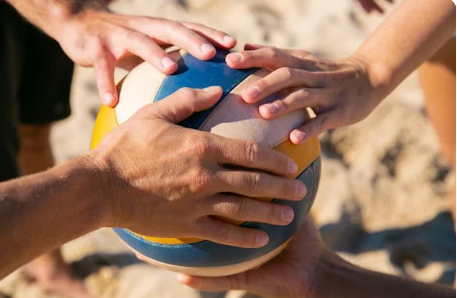Sportsmanship: More Than a Game – Your Secret Weapon to Shine & Win in Life

From Personal Trials to Life Lessons: My Sportsmanship Story
My first real taste of challenging norms came in Class 5, when I decided to learn swimming at the local pool. As a lean, somewhat frail kid, I was surrounded by strong, accomplished swimmers, some of whom openly doubted I had the 'right build' for the sport. That skepticism, however, only ignited my competitive spirit. I made it my personal mission to prove them wrong. Rising with the dawn, I was the first one at the pool every morning at 5:30 am, dedicating an hour to rigorous practice before school. Alongside this, I focused on eating better and committed to exercises designed to build my strength. The very next year, that dedication bore fruit: I won the sub-junior backstroke event. This early triumph fueled a passion that eventually led me to proudly represent Kerala in both swimming and water polo.
Years later, at 37, I embarked on a new athletic challenge: the captivating world of golf, starting on the beautiful courses of Thailand. Bangkok, with its plentiful driving ranges, offered what seemed like endless opportunities to hit balls. Unfortunately, I fell into a classic beginner's trap – chasing power and distance above all, launching countless shots without any real focus on accuracy, which is the cornerstone of any skilled golfer's game. Unsurprisingly, this undisciplined practice quickly led to the unraveling of my technique. When I played on the actual golf course, my shots were consistently and wildly off-target, often leaving me struggling with an embarrassing score, sometimes 25 over par, and a deep sense of frustration. Despite all my effort, the ingrained bad habits stubbornly resisted improvement. It wasn't until after several months of intensive corrective work back at Army Golf Courses that a pivotal introduction changed everything: I discovered the transformative power of visualization. From that point, I began to meticulously visualize every detail of the golf shot sequence for every club in my bag, a practice that started to rebuild my game from the ground up.
These distinct experiences – the hard-won success in swimming fueled by sheer grit and determination, and the journey of overcoming significant setbacks in golf through a new mindset and relentless stroke corrections – were profoundly formative. They instilled in me invaluable lessons not just about sport, but about the very essence of sportsmanship. Chief among these was cultivating a resilient, 'never say die' attitude, a quality that has since empowered me to navigate numerous academic and life challenges with greater grace and perseverance.
Sportsmanship: More Than Just Rules, It’s a Mindset for Life
Ever watched a tense match and admired how athletes handle themselves, win or lose? That's sportsmanship in action. But it's not just for the pros on the field. Believe it or not, the way you play any "game"—whether it's a group project, a challenging course, or even navigating friendships—says a lot about you and can seriously set you up for success.
At ShineAndWin, we believe sportsmanship is a superpower. It's about fair play, respect, and bouncing back, qualities that help you not just in sports, but in your studies, future career, and basically, all of life! So, what’s sportsmanship really got to do with your success? Let’s break it down.
How Fair Play Builds Your Success Toolkit
Think of sportsmanship as your personal training ground for essential life skills. The qualities you build by being a good sport are exactly what you need to navigate your student life and beyond.
- Team Up for Success: Collaboration Skills from Sports to Studies Sports are all about teamwork, right? You learn to communicate, share responsibility, and work with different personalities to achieve a common goal. Guess what? That’s exactly what you need for those killer group presentations, study circles, and eventually, rocking it in a professional team. Learning to collaborate well helps everyone shine.
- Beyond the Sidelines: Respect, Empathy, and Real-World Wins Good sportsmanship teaches respect – for your teammates, opponents, coaches, and even the rules. The United States Olympic & Paralympic Committee (USOPC) defines a good sport as someone whose conduct and attitude demonstrate gracious behavior always. This translates into valuing different opinions in class debates, understanding diverse perspectives in your social circles, and generally being a more well-rounded individual. When you respect others, you earn respect.
- Fail Forward: Building Resilience On and Off the Field Let’s be real, you can’t win every time. Experiencing both victories and defeats, and handling both with grace, builds incredible resilience. You learn to dust yourself off after a setback, learn from what went wrong, and come back stronger. This grit is gold when you’re facing tough exams, challenging assignments, or any of life’s curveballs.
- The Discipline Advantage: Managing Your Time, Owning Your Goals Being part of a team or any disciplined activity demands commitment. You learn to manage your time effectively, show up prepared, and stick to your goals – whether it’s acing that module or preparing for an internship interview. This self-discipline is a cornerstone for academic and professional achievement.
- Lead by Example: How Sportsmanship Shapes Future Leaders Sportsmanship isn't just about following rules; it’s about taking initiative, encouraging others, and being accountable. These are leadership qualities in the making! Whether you’re captain of a debate team or just a supportive friend, practicing these skills helps you shine and inspire others to win too.
The Unwritten Rules: Understanding the True Spirit of Sportsmanship
Legendary tennis player Chris Evert-Lloyd once said, "If you can react the same way to winning and losing, that's a big accomplishment. That quality is important because it stays with you the rest of your life..." This hits the nail on the head. True sportsmanship is an ethos, a way of approaching challenges with fairness, integrity, and respect, whether you're winning or losing. It’s understanding, as good coaches explain, that competition is like a shared arena where we challenge each other to improve, not a battleground fueled by negativity.
It’s about how you carry yourself. As author Harvey Mackay put it, "How people play the game shows something of their character. How they lose shows all of it." This spirit of fair play and mutual respect is what truly defines a winner in the long run.
Game Changers: Inspiring Moments of True Sportsmanship (And What We Learn)
The world of sports is full of amazing examples that go beyond just scores and trophies. These moments teach us about integrity, empathy, and courage:
- The Ultimate Respect (Federer & Nadal, Wimbledon): After an epic, long final, Rafael Nadal didn't just celebrate his win; he immediately showed empathy for a visibly disappointed Roger Federer. Federer, in turn, graciously praised Nadal. Lesson: True champions respect their rivals, win or lose.
- Friendship Over Politics (Jesse Owens & Luz Long, 1936 Olympics): Under the intense pressure of Nazi Germany, German athlete Luz Long advised American Jesse Owens, helping Owens qualify and win gold (Long took silver). Their public friendship was a powerful statement. Lesson: Humanity and connection can triumph over any division.
- Putting Others First (Lawrence Lemieux, 1988 Olympics): This Canadian sailor abandoned his race (while in a medal position!) to rescue competitors whose boat had capsized. He finished 22nd but won a medal for sportsmanship. Lesson: Sometimes the greatest victories come from helping others, a principle that shines brightly in any career or life path.
- Honesty is the Best Policy (Adam Gilchrist, 2003 Cricket World Cup): Despite the umpire not giving him out, cricketer Adam Gilchrist chose to walk because he knew he’d hit the ball. Lesson: Integrity often means doing the right thing, even when no one else would know.
- Lifting Each Other Up (Isaiah Jewett & Nijel Amos, 2020 Tokyo Olympics): After accidentally tripping over each other in an 800m race, these runners helped each other up and finished together. Lesson: Even in competition, empathy and support can define the moment.
These athletes show us that how you compete is just as important as whether you win. They inspire us to bring integrity and a human touch to every challenge we face.
Your Game Plan: Ways to Build Winning Sportsmanship Skills Now
Good news! Sportsmanship isn't something you're just born with; it's a skill you can actively develop. Here’s how you, as a student, can cultivate these "ShineAndWin" qualities:

- Get in the Game: Embrace Teamwork Join a sports team, a study group, a university club, or even volunteer for a team-based project. Focus on clear communication, listen actively, and learn to give and receive constructive feedback. Collective success helps everyone shine.
- See All Angles: Value Diverse Perspectives Don’t shy away from discussions with people who have different opinions. In class, online, or with friends, practice really listening to understand their viewpoint, even if you don’t agree. It’ll make you a more thoughtful and well-rounded person.
- Post-Game Analysis: Reflect, Learn, Improve After any challenge – a tough exam, a project that didn’t go as planned, or even a disagreement – take a moment to reflect. What did you learn? What could you do differently next time? Focus on growth, not blame.
- Train for Life: Master Discipline & Time Management Treat your studies and commitments like an athlete treats training. Create a realistic schedule, stick to it, and build the discipline to see things through. This will pay off massively in your academics and future career.
- Step Up & Support: Everyday Leadership Look for small ways to lead and support others. Organize a study session, offer help to a classmate who’s struggling, or simply be the encouraging voice in a group. True leaders lift others up.
- Learn from the Greats: Seek Mentorship Identify teachers, coaches, older students, or professionals you admire for their integrity and grace under pressure. Don’t be afraid to ask them for advice on navigating challenges.
Play Fair, Win Big: The Lasting Power of Sportsmanship
Developing good sportsmanship isn't just about being "nice." It's about building a strong character, resilience, and the interpersonal skills that are essential for shining in your studies, launching a successful career, and leading a fulfilling life. These are the qualities that lead to lasting success, the kind that truly lets you Shine Bright & Win Big. So, get out there, compete with heart, treat others with respect, and watch how far the spirit of fair play can take you!
